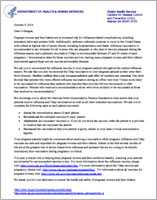Vaccinating Pregnant Patients
Pregnant women should receive a dose of the tetanus toxoid, reduced diphtheria toxoid, and acellular pertussis (Tdap) vaccine during each pregnancy, preferably during the early part of gestational weeks 27 through 36. A strong recommendation from you, their prenatal care provider, is the single best predictor of vaccination. It ultimately influences whether or not your patients’ newborns are born with protection against pertussis.
Tdap and Influenza Vaccination of Pregnant Women
Letter to Providers: Tdap and Influenza Vaccination of Pregnant Women [2 pages] Oct 2014
Tdap during Pregnancy Provides the Best Protection for Mother and Infant
In October 2012, the Advisory Committee on Immunization Practices (ACIP) voted to recommend that healthcare personnel should administer a dose of Tdap during each pregnancy irrespective of the patient’s prior history of receiving Tdap (or Td). This strategy not only helps protect the mother from getting and passing pertussis on to her infant, but also provides passive immunity to the infant. A recent U.S. study looked to see how effective Tdap was at preventing pertussis in infants whose mothers got the vaccine while pregnant or in the hospital after giving birth. The study found that getting Tdap during gestational weeks 27 through 36 weeks is 85% more effective at preventing pertussis in infants younger than 2 months old.
To maximize the passive antibody transfer to the infant, you should administer Tdap during the early part of gestational weeks 27 through 36. The level of pertussis antibodies decreases over time, so you should administer Tdap during every pregnancy in order to transfer the greatest number of protective antibodies to each infant.
The American College of Obstetricians and Gynecologists (ACOG) and the American College of Nurse-Midwives [4 pages] support this recommendation.
Postpartum Tdap Administration Is NOT Optimal
Vaccinating your patients with Tdap during pregnancy will prevent more infant hospitalizations and deaths from pertussis than postpartum vaccination and “cocooning.”
Share these 5 tips with your staff: Provide the Best Prenatal Care to Prevent Pertussis [1.31 MB, 2 pages].
Postpartum Tdap administration only provides protection to the mother — it does not provide immunity to the infant. It takes about 2 weeks after Tdap receipt for the mother to have protection against pertussis, thereby putting her at risk for contracting and spreading the disease to her vulnerable newborn during this time. Once the mother has protection, she is less likely to transmit pertussis to her infant. However, the newborn remains at risk of contracting pertussis from others, including siblings, grandparents, and other caregivers.
You should vaccinate pregnant women with Tdap during pregnancy to help prevent more infant hospitalizations and deaths from pertussis than would be prevented by postpartum vaccination. The only time a woman should be administered the vaccine postpartum is if she has never received Tdap before. Repeat postpartum vaccination is not an ACIP recommendation.
Cocooning Alone May Not Be Effective and Is Difficult to Implement
The strategy of protecting infants from pertussis by vaccinating those in close contact with them is known as “cocooning.” ACIP has recommended cocooning with Tdap vaccine since 2005. However, full implementation of cocooning has proven to be a challenge, limiting its impact as an independent prevention strategy. Even though cocooning alone may not be sufficient, ACIP continues to recommend this strategy for all those with expected close contact with infants younger than 1 year of age. Cocooning, in combination with maternal Tdap vaccination during pregnancy and administering the childhood DTaP series on schedule, provides the best protection to the infant.
In addition to vaccinating your pregnant patients with Tdap, you should educate them about encouraging others who will have contact with the infant – including fathers, grandparents and other infant caregivers – to be up to date with pertussis vaccination. For family members who aren’t up to date with their pertussis vaccine, clinicians should vaccinate them at least 2 weeks before coming into contact with the infant.
Tdap Should NOT Be Offered as Part of Routine Preconception Care
Protection from pertussis vaccines is not long lasting, so CDC recommends Tdap during pregnancy in order to provide optimal protection (i.e., greatest number of antibodies) to the infant. If you administer Tdap at a preconception visit, you should administer it again during pregnancy between 27 through 36 weeks gestation.
Tdap Can Be Safely Administered Earlier in Pregnancy if Needed
Pregnant women should receive Tdap anytime during pregnancy if it is indicated (e.g., wound care, during a community pertussis outbreak). If you administer Tdap earlier in pregnancy, you do not need to repeat it between 27 through 36 weeks gestation; CDC recommends only one dose during each pregnancy.
- Page last reviewed: June 29, 2017
- Page last updated: June 29, 2017
- Content source:



 ShareCompartir
ShareCompartir
